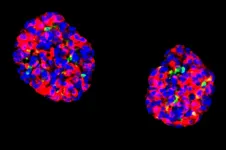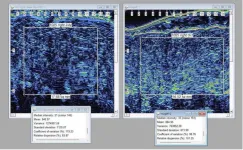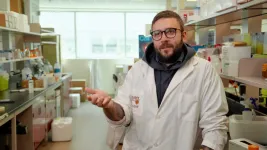(Press-News.org) Large study provides scientists with deeper insight into long COVID symptoms
NIH-funded research effort identifies most common symptoms, potential subgroups, and initial symptom-based scoring system – with aim of improving future diagnostics and treatment
Initial findings from a study of nearly 10,000 Americans, many of whom had COVID-19, have uncovered new details about long COVID, the post-infection set of conditions that can affect nearly every tissue and organ in the body. Clinical symptoms can vary and include fatigue, brain fog, and dizziness, and last for months or years after a person has COVID-19. The research team, funded by the National Institutes of Health, also found that long COVID was more common and severe in study participants infected before the 2021 Omicron variant.
The study, published in JAMA, is coordinated through the NIH’s Researching COVID to Enhance Recovery (RECOVER) initiative, a nationwide effort dedicated to understanding why some people develop long-term symptoms following COVID-19, and most importantly, how to detect, treat, and prevent long COVID. The researchers hope this study is the next step toward potential treatments for long COVID, which affects the health and wellbeing of millions of Americans.
“Americans living with long COVID want to understand what is happening with their bodies,” said ADM Rachel L. Levine, M.D., Assistant Secretary for Health. “RECOVER, as part of a broader government response, in collaboration with academia, industry, public health institutions, advocacy organizations and patients, is making great strides toward improving our understanding of long COVID and its associated conditions.”
Researchers examined data from 9,764 adults, including 8,646 who had COVID-19 and 1,118 who did not have COVID-19. They assessed more than 30 symptoms across multiple body areas and organs and applied statistical analyses that identified 12 symptoms that most set apart those with and without long COVID: post-exertional malaise, fatigue, brain fog, dizziness, gastrointestinal symptoms, heart palpitations, issues with sexual desire or capacity, loss of smell or taste, thirst, chronic cough, chest pain, and abnormal movements.
They then established a scoring system based on patient-reported symptoms. By assigning points to each of the 12 symptoms, the team gave each patient a score based on symptom combinations. With these scores in hand, researchers identified a meaningful threshold for identifying participants with long COVID. They also found that certain symptoms occurred together and defined four subgroups or “clusters” with a range of impacts on health.
Based on a subset of 2,231 patients in this analysis who had a first COVID-19 infection on or after Dec. 1, 2021, when the Omicron variant was circulating, about 10% experienced long-term symptoms or long COVID after six months. The results are based on a survey of a highly diverse set of patients and are not final. Survey results will next be compared for accuracy against an array of lab tests and imaging.
To date, more than 100 million Americans have been infected with SARS-CoV-2, the virus that causes COVID-19. As of April, the federal government’s Household Pulse survey estimates that about 6% of those infected with the virus continue to experience and suffer from the many symptoms termed together as long COVID. Patients and researchers have identified more than 200 symptoms associated with long COVID.
“This study is an important step toward defining long COVID beyond any one individual symptom,” said study author Leora Horwitz, M.D., director of the Center for Healthcare Innovation and Delivery Science, and co-principal investigator for the RECOVER Clinical Science Core, at NYU Langone Health. “This approach — which may evolve over time — will serve as a foundation for scientific discovery and treatment design.”
The researchers explain studying the underlying biological mechanisms of long COVID is central to advancing informed interventions and identifying effective treatment strategies.
In addition to establishing the scoring system, the researchers found that participants who were unvaccinated or who had COVID-19 before the Omicron strain emerged in 2021 were more likely to have long COVID and more severe cases of long COVID. Further, reinfections were also linked to higher long COVID frequency and severity, compared to people who only had COVID-19 once.
“While the score developed in this study is an important research tool and early step toward diagnosing and monitoring patients with long COVID, we recognize its limitations,” said David C. Goff, M.D., Ph.D., director of the Division of Cardiovascular Sciences at the National Heart, Lung, and Blood Institute, part of NIH. Goff serves as an epidemiology lead for NIH RECOVER. “All patients suffering from long COVID deserve the attention and respect of the medical field, as well as care and treatment driven by their experiences. As treatments are developed, it will be important to consider the complete symptom profile.”
The ongoing RECOVER research serves as the foundation for planned clinical trials, whose interventions are rooted in many of the symptoms outlined in this study. RECOVER clinical trials are expected to begin enrolling patient participants in 2023.
This research was funded by NIH agreements OT2HL161841, OT2HL161847, and OT2HL156812. Additional support came from grant R01 HL162373. For more information on RECOVER, visit https://recovercovid.org.
###
About RECOVER: The National Institutes of Health Researching COVID to Enhance Recovery (NIH RECOVER) Initiative is a $1.15 billion effort, including support through the American Rescue Plan Act of 2021, that seeks to identify how people recuperate from COVID-19, and who are at risk for developing post-acute sequelae of SARS-CoV-2 (PASC). Researchers are also working with patients, clinicians, and communities across the United States to identify strategies to prevent and treat the long-term effects of COVID – including long COVID. For more information, please visit recovercovid.org.
About the National Institutes of Health (NIH): NIH, the nation's medical research agency, includes 27 Institutes and Centers and is a component of the U.S. Department of Health and Human Services. NIH is the primary federal agency conducting and supporting basic, clinical, and translational medical research, and is investigating the causes, treatments, and cures for both common and rare diseases. For more information about NIH and its programs, visit www.nih.gov.
HHS Long COVID Coordination: This work is a part of the National Research Action Plan (opens pdf), a broader government-wide effort in response to the Presidential Memorandum directing the Secretary for the Department of Health and Human Services to mount a full and effective response to long COVID. Led by Assistant Secretary for Health Admiral Rachel Levine, the Plan and its companion Services and Supports for Longer-term Impacts of COVID-19 (opens pdf) report lay the groundwork to advance progress in the prevention, diagnosis, treatment, and provision of services for individuals experiencing long COVID.
NIH...Turning Discovery Into Health
END
Large study provides scientists with deeper insight into long COVID symptoms
NIH-funded research effort identifies most common symptoms, potential subgroups, and initial symptom-based scoring system – with aim of improving future diagnostics and treatment
2023-05-25
ELSE PRESS RELEASES FROM THIS DATE:
Intravenous plus periarticular corticosteroids improve rehabilitation measures after knee replacement
2023-05-25
May 25, 2023 – For patients undergoing total knee arthroplasty (TKA), a combination of intravenous and periarticular corticosteroids does not improve pain control – but, may improve key indicators of functional recovery in the days after surgery, reports a trial in The Journal of Bone & Joint Surgery. The journal is published in the Lippincott portfolio in partnership with Wolters Kluwer.
Intravenous (IV) plus periarticular (PA) steroids "yielded more significant improvements in the rehabilitation parameters," ...
Microneedling plus cupping may aid skin rejuvenation
2023-05-25
May 25, 2023 – A combination of emerging and alternative techniques – microneedling to induce collagen and cupping to increase tissue perfusion – may have a synergistic effect in producing skin rejuvenation, according to an experimental study in the June issue of Plastic and Reconstructive Surgery®, the official medical journal of the American Society of Plastic Surgeons (ASPS). The journal is published in the Lippincott portfolio by Wolters Kluwer.
"Cupping therapy can be added to microneedling therapy and used to increase certain desired effects on skin," comments lead author Burak Pasinlioğlu, MD, of Kecioren Research ...
Scientists target human stomach cells for diabetes therapy
2023-05-25
Stem cells from the human stomach can be converted into cells that secrete insulin in response to rising blood sugar levels, offering a promising approach to treating diabetes, according to a preclinical study from researchers at Weill Cornell Medicine.
In the study, which appeared April 27 in Nature Cell Biology, the researchers showed that they could take stem cells obtained from human stomach tissue and reprogram them directly—with strikingly high efficiency—into cells that closely resemble pancreatic insulin-secreting cells known as beta cells. Transplants of small groups of these cells reversed disease signs in a mouse model of diabetes.
“This ...
Sage’s 10-Year Impact Awards recognize research with long-term influence
2023-05-25
For the fourth year, Sage has awarded 10-Year Impact Awards to three research articles that have had a lasting influence over the past decade. The awards are given to the authors of three papers published in Sage Journals in 2012 that have received the most citations in the 10 years since than all other studies published in the same year.
The three winning papers are:
“The Nature and Organization of Individual Differences in Executive Functions: Four General Conclusions” by Akira Miyake and Naomi P. Friedman in Current Directions ...
CU researchers weave deeper understanding of diverse ancestry and gene expression
2023-05-25
Exploring diverse ancestry is a critical factor in furthering medical research.
A new study published in Nature Genetics from researchers in the Department of Biomedical Informatics (DBMI) at the University of Colorado School of Medicine, in partnership with the University of California San Francisco and Stanford University, is the largest of its kind that focuses on ancestry correlations with biomedical traits and the first study to examine the role of genetic variants across diverse ...
Does body contouring increase long-term weight loss after bariatric surgery? New findings
2023-05-25
May 25, 2023 – For patients with massive weight loss after bariatric surgery, subsequent body contouring to remove excess skin is not itself associated with long-term weight loss, reports a study in the June issue of Plastic and Reconstructive Surgery®, the official medical journal of the American Society of Plastic Surgeons (ASPS). The journal is published in the Lippincott portfolio by Wolters Kluwer.
"In contrast to previous studies, we found that body contouring ...
Epigenetic mechanisms activated by GHK-Cu increase skin collagen density in clinical trial
2023-05-25
Skin loses collagen and elastin and becomes progressively thinner with age leading to wrinkles, so reversing this age-related loss of skin density is the holy grail of anti-aging treatments. One compound capable of doing that is the naturally occurring peptide GHK-Cu (GHK from glycyl-L-histidyl-L-lysine bound to a copper ion), which affects 31.2% of the human genes by either activating or deactivating them (based on a criterion of a reduction or increment in gene activity of more than 50%), meaning that it works by ...
Scientists use AI to find promising new antibiotic to fight evasive hospital superbug
2023-05-25
Attention editors: Embargoed by the journal Nature Chemical Biology until Thursday, May 25 at 11 a.m. easter
Hamilton, ON, May 25, 2023 – Scientists at McMaster University and the Massachusetts Institute of Technology have used artificial intelligence to discover a new antibiotic which could be used to fight a deadly, drug-resistant pathogen that strikes vulnerable hospital patients.
The process they used could also speed the discovery of other antibiotics to treat many other challenging ...
A metabolic process in cancer cells could unlock a possible treatment for glioblastoma
2023-05-25
A study led by researchers at the UCLA Jonsson Comprehensive Cancer Center has found that targeting a metabolic process in people with a specific genetic mutation could help treat glioblastoma, an aggressive brain cancer.
The genetic alteration — a deletion in a gene called CDKN2A — is present in about 60% of people who have glioblastoma. The mutation causes changes in the way lipids are distributed in cancer cells, which in turn makes the cancer cells vulnerable to being destroyed. The ...
Can sugar and fat influence immune cell responses?
2023-05-25
LA JOLLA, CA—A population of unconventional white blood cells has recently captured the attention of immunologists and clinicians alike. Unlike conventional T cells, which circulate throughout the body in our blood, mucosal-associated invariant T (MAIT) cells are largely found in tissues where they provide immune protection against a broad range of diseases.
MAIT cells are highly abundant in humans. Although they make up only 2 percent of the lymphocytes in blood, MAIT cells account for 10 to 40 percent of lymphocytes in the liver, and they are common in tissues such as lungs. Still, much about MAIT cell biology and clinical function remains unknown.
In ...
LAST 30 PRESS RELEASES:
Prolonged drought linked to instability in key nitrogen-cycling microbes in Connecticut salt marsh
Self-cleaning fuel cells? Researchers reveal steam-powered fix for ‘sulfur poisoning’
Bacteria found in mouth and gut may help protect against severe peanut allergic reactions
Ultra-processed foods in preschool years associated with behavioural difficulties in childhood
A fanged frog long thought to be one species is revealing itself to be several
Weill Cornell Medicine selected for Prostate Cancer Foundation Challenge Award
Largest high-precision 3D facial database built in China, enabling more lifelike digital humans
SwRI upgrades facilities to expand subsurface safety valve testing to new application
Iron deficiency blocks the growth of young pancreatic cells
Selective forest thinning in the eastern Cascades supports both snowpack and wildfire resilience
A sea of light: HETDEX astronomers reveal hidden structures in the young universe
Some young gamers may be at higher risk of mental health problems, but family and school support can help
Reduce rust by dumping your wok twice, and other kitchen tips
High-fat diet accelerates breast cancer tumor growth and invasion
Leveraging AI models, neuroscientists parse canary songs to better understand human speech
Ultraprocessed food consumption and behavioral outcomes in Canadian children
The ISSCR honors Dr. Kyle M. Loh with the 2026 Early Career Impact Award for Transformative Advances in Stem Cell Biology
The ISSCR honors Alexander Meissner with the 2026 ISSCR Momentum Award for exceptional work in developmental and stem cell epigenetics
The ISSCR honors stem cell COREdinates and CorEUstem with the 2026 ISSCR Public Service Award
Minimally invasive procedure effectively treats small kidney cancers
SwRI earns CMMC Level 2 cybersecurity certification
Doctors and nurses believe their own substance use affects patients
Life forms can planet hop on asteroid debris – and survive
Sylvia Hurtado voted AERA President-Elect; key members elected to AERA Council
Mount Sinai and King Saud University Medical City forge a three-year collaboration to advance precision medicine in familial inflammatory bowel disease
AI biases can influence people’s perception of history
Prenatal opioid exposure and well-being through adolescence
Big and small dogs both impact indoor air quality, just differently
Wearing a weighted vest to strengthen bones? Make sure you’re moving
Microbe survives the pressures of impact-induced ejection from Mars
[Press-News.org] Large study provides scientists with deeper insight into long COVID symptomsNIH-funded research effort identifies most common symptoms, potential subgroups, and initial symptom-based scoring system – with aim of improving future diagnostics and treatment



